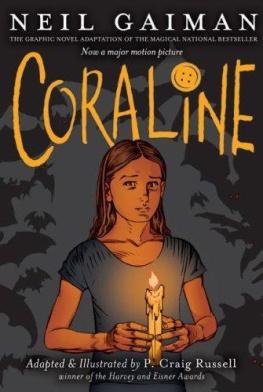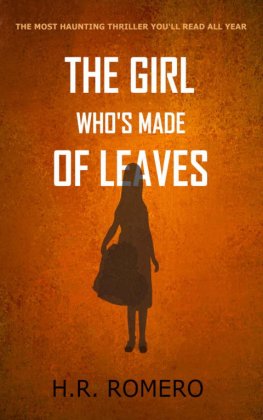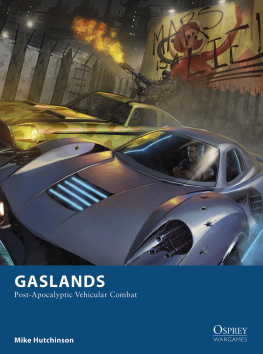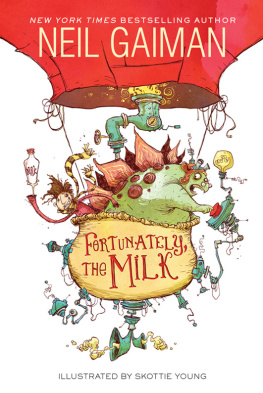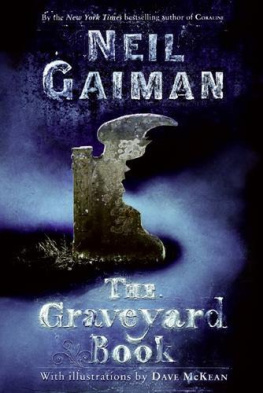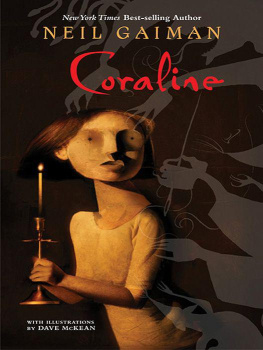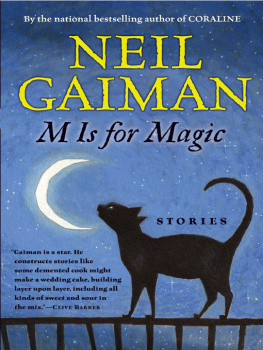Gaiman - Coraline
Here you can read online Gaiman - Coraline full text of the book (entire story) in english for free. Download pdf and epub, get meaning, cover and reviews about this ebook. year: 2010, genre: Art. Description of the work, (preface) as well as reviews are available. Best literature library LitArk.com created for fans of good reading and offers a wide selection of genres:
Romance novel
Science fiction
Adventure
Detective
Science
History
Home and family
Prose
Art
Politics
Computer
Non-fiction
Religion
Business
Children
Humor
Choose a favorite category and find really read worthwhile books. Enjoy immersion in the world of imagination, feel the emotions of the characters or learn something new for yourself, make an fascinating discovery.
Coraline: summary, description and annotation
We offer to read an annotation, description, summary or preface (depends on what the author of the book "Coraline" wrote himself). If you haven't found the necessary information about the book — write in the comments, we will try to find it.
Coraline: An adventurous girl finds another world that is a strangely idealized version of her frustrating home, but it has sinister secrets.
Coraline — read online for free the complete book (whole text) full work
Below is the text of the book, divided by pages. System saving the place of the last page read, allows you to conveniently read the book "Coraline" online for free, without having to search again every time where you left off. Put a bookmark, and you can go to the page where you finished reading at any time.
Font size:
Interval:
Bookmark:
Coraline
By Neil Gaiman
I started this forHolly
I finsished it forMaddy
Fairy tales are morethan true: not because they tell us that dragons exist,
but because they tellus that dragons can be beaten.
G. K.Chesterton
CORALINE DISCOVEREDTHE DOOR a little while after they moved into the house.
It was a very oldhouseit had an attic under the roof and a cellar under the ground and anovergrown garden with huge old trees in it.
Coraline's familydidn't own all of the houseit was too big for that. Instead they ownedpart of it.
There were otherpeople who lived in the old house.
Miss Spink and MissForcible lived in the flat below Coraline's, on the ground floor. They wereboth old and round, and they lived in their flat with a number of ageing Highlandterriers who had names like Hamish and Andrew and Jock. Once upon a time MissSpink and Miss Forcible had been actresses, as Miss Spink told Coraline thefirst time she met her.
You see,Caroline, Miss Spink said, getting Coraline's name wrong, bothmyself and Miss Forcible were famous actresses, in our time. We trod theboards, luvvy. Oh, don't let Hamish eat the fruitcake, or he'll be up all nightwith his tummy.
It's Coraline.Not Caroline. Coraline, said Coraline.
In the flat aboveCoraline's, under the roof, was a crazy old man with a big moustache. He toldCoraline that he was training a mouse circus. He wouldn't let anyone see it.
One day, littleCaroline, when they are all ready, everyone in the whole world will see thewonders of my mouse circus. You ask me why you cannot see it now. Is that whatyou asked me?
No, saidCoraline quietly, I asked you not to call me Caroline. It'sCoraline.
The reason youcannot see the mouse circus, said the man upstairs, is that themice are not yet ready and rehearsed. Also, they refuse to play the songs Ihave written for them. All the songs I have written for the mice to play gooompah oompah. But the white mice will only play toodle oodle, like that. I amthinking of trying them on different types of cheese.
Coraline didn't thinkthere really was a mouse circus. She thought the old man was probably making itup.
The day after theymoved in, Coraline went exploring.
She explored thegarden. It was a big garden: at the very back was an old tennis court, butno-one in the house played tennis and the fence around the court had holes init and the net had mostly rotted away; there was an old rose garden, filledwith stunted, flyblown rose-bushes; there was a rockery that was all rocks;there was a fairy ring, made of squidgy brown toadstools which smelled dreadfulif you accidentally trod on them.
There was also awell. Miss Spink and Miss Forcible made a point of telling Coraline howdangerous the well was, on the first day Coraline's family moved in, and warnedher to be sure she kept away from it. So Coraline set off to explore for it, sothat she knew where it was, to keep away from it properly.
She found it on thethird day, in an overgrown meadow beside the tennis court, behind a clump oftreesa low brick circle almost hidden in the high grass. The well hadbeen covered up by wooden boards, to stop anyone falling in. There was a smallknot-hole in one of the boards, and Coraline spent an afternoon droppingpebbles and acorns through the hole, and waiting, and counting, until she heardthe plop as they hit the water, far below.
Coraline alsoexplored for animals. She found a hedgehog, and a snake-skin (but no snake),and a rock that looked just like a frog, and a toad that looked just like arock.
There was also ahaughty black cat, who would sit on walls and tree stumps, and watch her; butwould slip away if ever she went over to try to play with it.
That was how shespent her first two weeks in the houseexploring the garden and thegrounds.
Her mother made hercome back inside for dinner, and for lunch; and Coraline had to make sure shedressed up warm before she went out, for it was a very cold summer that year;but go out she did, exploring, every day until the day it rained, when Coralinehad to stay inside.
What should Ido? asked Coraline.
Read abook, said her mother. Watch a video. Play with your toys. Go andpester Miss Spink or Miss Forcible, or the crazy old man upstairs.
No, saidCoraline. I don't want to do those things. I want to explore.
I don't reallymind what you do, said Coraline's mother, as long as you don't makea mess.
Coraline went over tothe window and watched the rain come down. It wasn't the kind of rain you couldgo out in, it was the other kind, the kind that threw itself down from the skyand splashed where it landed. It was rain that meant business, and currentlyits business was turning the garden into a muddy, wet soup.
Coraline had watchedall the videos. She was bored with her toys, and she'd read all her books.
She turned on thetelevision. She went from channel to channel to channel, but there was nothingon but men in suits talking about the stock market, and schools programmes.Eventually, she found something to watch: it was the last half of a naturalhistory programme about something called protective coloration. She watchedanimals, birds and insects which disguised themselves as leaves or twigs orother animals to escape from things that could hurt them. She enjoyed it, butit ended too soon, and was followed by a programme about a cake factory.
It was time to talkto her father.
Coraline's father washome. Both of her parents worked, doing things on computers, which meant thatthey were home a lot of the time. Each of them had their own study.
Hello,Coraline, he said when she came in, without turning round.
Mmph,said Coraline. It's raining.
Yup, saidher father. It's bucketing down.
No, saidCoraline, it's just raining. Can I go outside?
What does yourmother say?
She says,'You're not going out in weather like that, Coraline Jones'.
Then, no.
But I want tocarry on exploring.
Then explorethe flat, suggested her father. Lookhere's a piece of paperand a pen. Count all the doors and windows. List everything blue. Mount anexpedition to discover the hot-water tank. And leave me alone to work.
Can I go intothe drawing room? The drawing room was where the Joneses kept theexpensive (and uncomfortable) furniture Coraline's grandmother had left themwhen she died. Coraline wasn't allowed in there. Nobody went in there. It wasonly for best.
If you don'tmake a mess. And you don't touch anything.
Coraline consideredthis carefully, then she took the paper and pen and went off to explore theinside of the flat.
She discovered thehot-water tank (it was in a cupboard in the kitchen).
She countedeverything blue (153).
She counted thewindows (21).
She counted the doors(14).
Of the doors that shefound, thirteen opened and closed. The other, the big, carved, brown woodendoor at the far corner of the drawing room, was locked.
She said to hermother, Where does that door go?
Nowhere,dear.
It has to gosomewhere.
Her mother shook herhead. Look, she told Coraline.
She reached up, andtook a string of keys from the top of the kitchen doorframe. She sorted throughthem carefully and selected the oldest, biggest, blackest, rustiest key. Theywent into the drawing room. She unlocked the door with the key.
The door swung open.
Her mother was right.The door didn't go anywhere. It opened on to a brick wall.
When this placewas just one house, said Coraline's mother, that door wentsomewhere. When they turned the house into flats, they simply bricked it up.The other side is the empty flat on the other side of the house, the one that'sstill for sale.
She shut the door andput the string of keys back on top of the kitchen doorframe.
Font size:
Interval:
Bookmark:
Similar books «Coraline»
Look at similar books to Coraline. We have selected literature similar in name and meaning in the hope of providing readers with more options to find new, interesting, not yet read works.
Discussion, reviews of the book Coraline and just readers' own opinions. Leave your comments, write what you think about the work, its meaning or the main characters. Specify what exactly you liked and what you didn't like, and why you think so.

